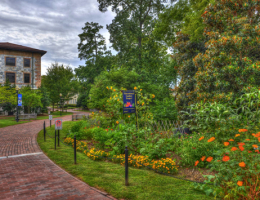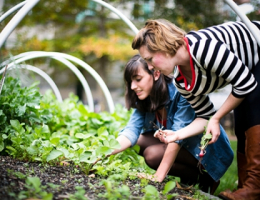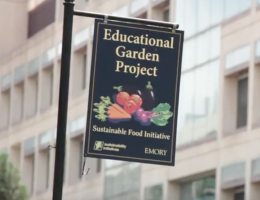Educational gardens Highlights
The Emory Educational Garden Project is intended to make small-scale food production accessible through transferring gardening knowledge at weekly workdays and sharing fresh produce with volunteers.
Eight small but productive garden plots across campus are maintained by the Office of Sustainability Initiatives and Emory community members, providing communal spaces to work and grow food together.
Educational gardens Benefits
- A variety of produce, including tomatoes, lettuce, beans, eggplants, broccoli, strawberries, kohlrabi, and more, are all grown in the Emory Educational Gardens around campus.
- The fruits and vegetables in the gardens are grown for educational purposes, to help aspiring gardeners become more comfortable with growing food. Volunteers are also rewarded with the fruits of their labor by taking home the produce that they cultivate and harvest.
- The Educational Gardens contribute to our Sustainability Vision by providing a safe habitat for pollinators and replacing turf grass with more biodiverse ecosystems.
How It Works
- The gardens are maintained by teams of volunteers that meet for weekly workdays. Most gardens are led by undergraduate and graduate student groups, departments, or classes, but all members of the Emory community are welcome to volunteer. No prior experience is needed!
- Volunteers assist with maintenance tasks, including weeding, planting, watering, and of course, harvesting in any of the 8 gardens:
- Cox Hall
- The Depot
- WoodPEC (by the tennis courts)
- Clairmont Campus
- The School of Theology
- The School of Medicine
- Rollins School of Public Health
- The School of Nursing
- The workday schedule is available on the Emory OSI Calendar, or through the gardening listserv. To be added to the listserv or for any other questions, contact the Educational Garden Project Coordinator, Erik Edwards.
Community outreach at the Emory Educational Garden Project
2019 to 2021
- Developed partnership with Bread Coffeehouse to offer produce upon request to students accessing food through the Eagle Food Co-op
- Worked with the Emory Autism Center and their MYlife program by providing guided garden volunteer hours to the individuals with autism in the program
- Provided guided workdays to a group of middle and high school students from local schools to help them achieve the required volunteer hours over summer vacation
- Participated in the School of Public Health’s “Rollins-teer day” by guiding a group of incoming students through a morning of volunteering on campus
- Provided garden workdays to multiple Emory courses including courses in the English and romance languages departments
- Started a pollinator garden to be placed on the Carter Center Butterfly Trail and assisted campus groups with the prospect of starting and registering more on campus
- Gave campus gardens tours for the Emory SEED Program. (a group on campus that aims to increase enthusiasm and interest in college for low income Atlanta area schools)
- Participated in having tables at both of the Emory sustainable food fairs
- Helped research at Emory by providing some garden space to researchers who needed plants to be cultivated outside as well as allowed for the collection of insects in the gardens for research
- Provided tours of the Emory research greenhouses to multiple EEGP volunteer groups and clubs associated with EEGP
Candler School of Theology Garden
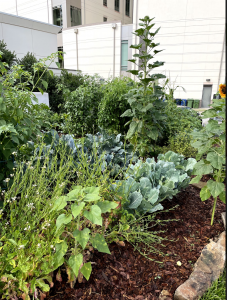
The Theology garden is the largest of the Educational Gardens on campus, and was first created in partnership between the Candler School of Theology and Department of Physics.
The gardens are maintained by teams of volunteers that meet for weekly workdays. Most gardens are led by undergraduate and graduate student groups, departments, or classes, but all members of the Emory community are welcome to volunteer. No prior experience is needed.
Cox Hall Garden
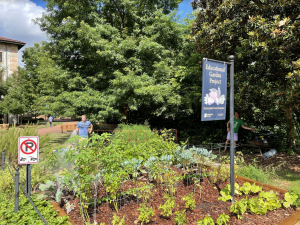
The gardens are maintained by teams of volunteers that meet for weekly workdays. Most gardens are led by undergraduate and graduate student groups, departments, or classes, but all members of the Emory community are welcome to volunteer. No prior experience is needed.
Depot Garden
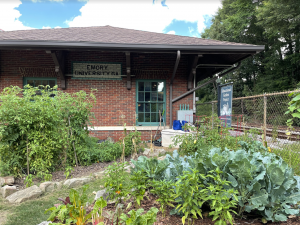
The gardens are maintained by teams of volunteers that meet for weekly workdays. Most gardens are led by undergraduate and graduate student groups, departments, or classes, but all members of the Emory community are welcome to volunteer. No prior experience is needed.
James B. Williams School of Medicine Garden
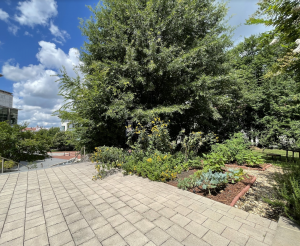
The gardens are maintained by teams of volunteers that meet for weekly workdays. Most gardens are led by undergraduate and graduate student groups, departments, or classes, but all members of the Emory community are welcome to volunteer. No prior experience is needed.
Nell Hogdson Woodruff School of Nursing Garden
The gardens are maintained by teams of volunteers that meet for weekly workdays. Most gardens are led by undergraduate and graduate student groups, departments, or classes, but all members of the Emory community are welcome to volunteer. No prior experience is needed.
Rollins School of Public Health Garden
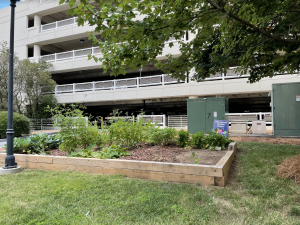
The gardens are maintained by teams of volunteers that meet for weekly workdays. Most gardens are led by undergraduate and graduate student groups, departments, or classes, but all members of the Emory community are welcome to volunteer. No prior experience is needed.
WoodPEC Garden
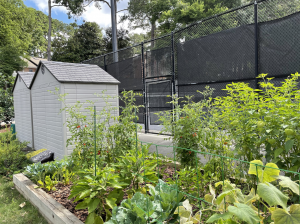
The gardens are maintained by teams of volunteers that meet for weekly workdays. Most gardens are led by undergraduate and graduate student groups, departments, or classes, but all members of the Emory community are welcome to volunteer. No prior experience is needed.

